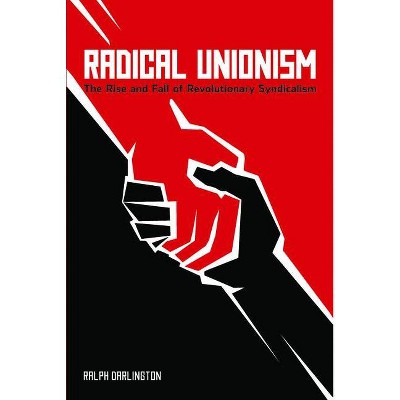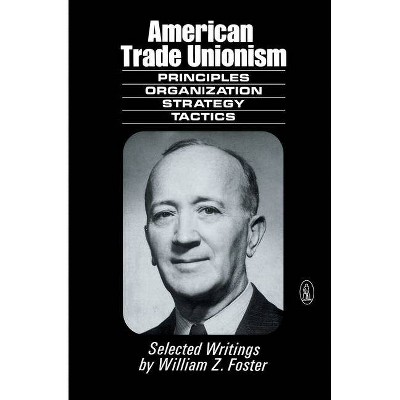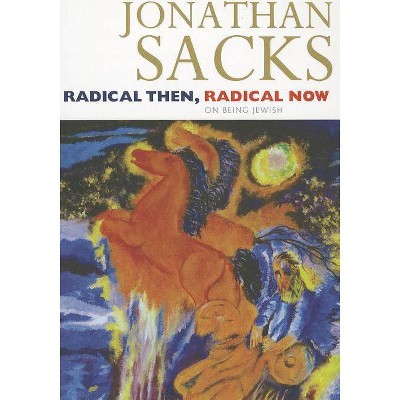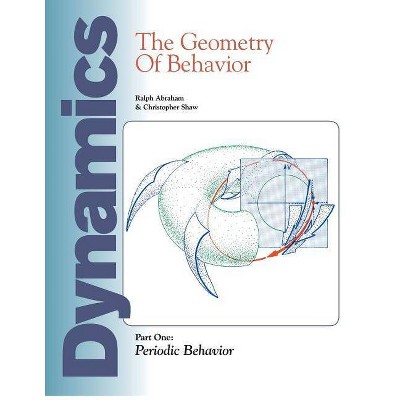Radical Unionism - 2nd Edition by Ralph Darlington (Paperback)

Similar Products
Products of same category from the store
AllProduct info
<p/><br></br><p><b> About the Book </b></p></br></br>Though often seen as opposing ideas, Darlington engagingly traces the entwined legacy of revolutionary syndicalism and the communist movement.<p/><br></br><p><b> Book Synopsis </b></p></br></br>During the first two decades of the twentieth century the ideas of revolutionary syndicalism developed into a major influence within the trade union movement. Committed to destroying capitalism through direct industrial action and revolutionary trade union struggle, the movement raised fundamental questions for activists across the world. <p/><i>Radical Unionism</i> provides an analysis of the dynamics and trajectory of the syndicalist movement in six specific countries: France, Spain, Italy, America, Britain and Ireland, and provides a systematic examination of the relationship between syndicalism and communism.<p/><br></br><p><b> Review Quotes </b></p></br></br><br><br>[<em>Radical Unionism</em>] is a rich text and source of information. It deserves to and no doubt will become a standard point of reference for anyone wishing to understand the nature of syndicalism in the period under question.<br>-- Martin Upchurch, <em>Journal of Industrial Relations </em> <p/>This is a very valuable, well thought out and useful volume. . . . Darlington's work will remain a touchstone for scholarly debate on syndicalism for years to come.<br>--<em>European History Quarterly</em> <p/>Darlington's book impressively pulls together the diverse literature on syndicalism. But more importantly, by looking at syndicalist politics thematically and studying their often stormy relationship with the Communists after the Russian Revolution, he has done a service to all those grappling today with how to engage with the politics of trade unions and political trade unionism.<br>--Simon Basketer, <em>International Socialism</em> <p/>All in all, Darlington has delivered an informative representation of syndicalism that highlights its essential features and lays out the debates and experiences that defined it in a clearly constructed synthesis.<br>--<em>International Journal of Social History</em> <p/>Overall, then, it represents an ambitious and insightful attempt to synthesize a substantial volume of material.<br>--<em>Labor History Review </em> <p/>Informed, informative, enhanced with an extensive bibliography and a comprehensive index, <em>Radical Unionism: The Rise and Fall of Revolutionary Syndicalism</em> is an extraordinary work of seminal scholarship and highly recommended for academic library collections.<br>--<em>The Midwest Book review</em><br><br><br>[<i>Radical Unionism</i>] is a rich text and source of information. It deserves to and no doubt will become a standard point of reference for anyone wishing to understand the nature of syndicalism in the period under question.<br>-- Martin Upchurch, <i>Journal of Industrial Relations </i> <p/>This is a very valuable, well thought out and useful volume. . . . Darlington's work will remain a touchstone for scholarly debate on syndicalism for years to come.<br>--<i>European History Quarterly</i> <p/>Darlington's book impressively pulls together the diverse literature on syndicalism. But more importantly, by looking at syndicalist politics thematically and studying their often stormy relationship with the Communists after the Russian Revolution, he has done a service to all those grappling today with how to engage with the politics of trade unions and political trade unionism.<br>--Simon Basketer, <i>International Socialism</i> <p/>All in all, Darlington has delivered an informative representation of syndicalism that highlights its essential features and lays out the debates and experiences that defined it in a clearly constructed synthesis.<br>--<i>International Journal of Social History</i> <p/>Overall, then, it represents an ambitious and insightful attempt to synthesize a substantial volume of material.<br>--<i>Labor History Review </i> <p/>Informed, informative, enhanced with an extensive bibliography and a comprehensive index, <i>Radical Unionism: The Rise and Fall of Revolutionary Syndicalism</i> is an extraordinary work of seminal scholarship and highly recommended for academic library collections.<br>--<i>The Midwest Book review</i><br><p/><br></br><p><b> About the Author </b></p></br></br>Ralph Darlington is Professor of Employment Relations at the University of Salford. His research is concerned with the dynamics of trade union organisation, activity and consciousness in Britain and internationally within both contemporary and historical settings. He is author of <i>The Dynamics of Workplace Unionism</i>), and <i>The Political Trajectory of J.T. Murphy</i>; co-author of <i>Glorious Summer: Class Struggle in Britain</i>; and editor of <i>What's the Point of Industrial Relations?: In Defence of Critical Social Science</i>.
Price History
Price Archive shows prices from various stores, lets you see history and find the cheapest. There is no actual sale on the website. For all support, inquiry and suggestion messages communication@pricearchive.us




















